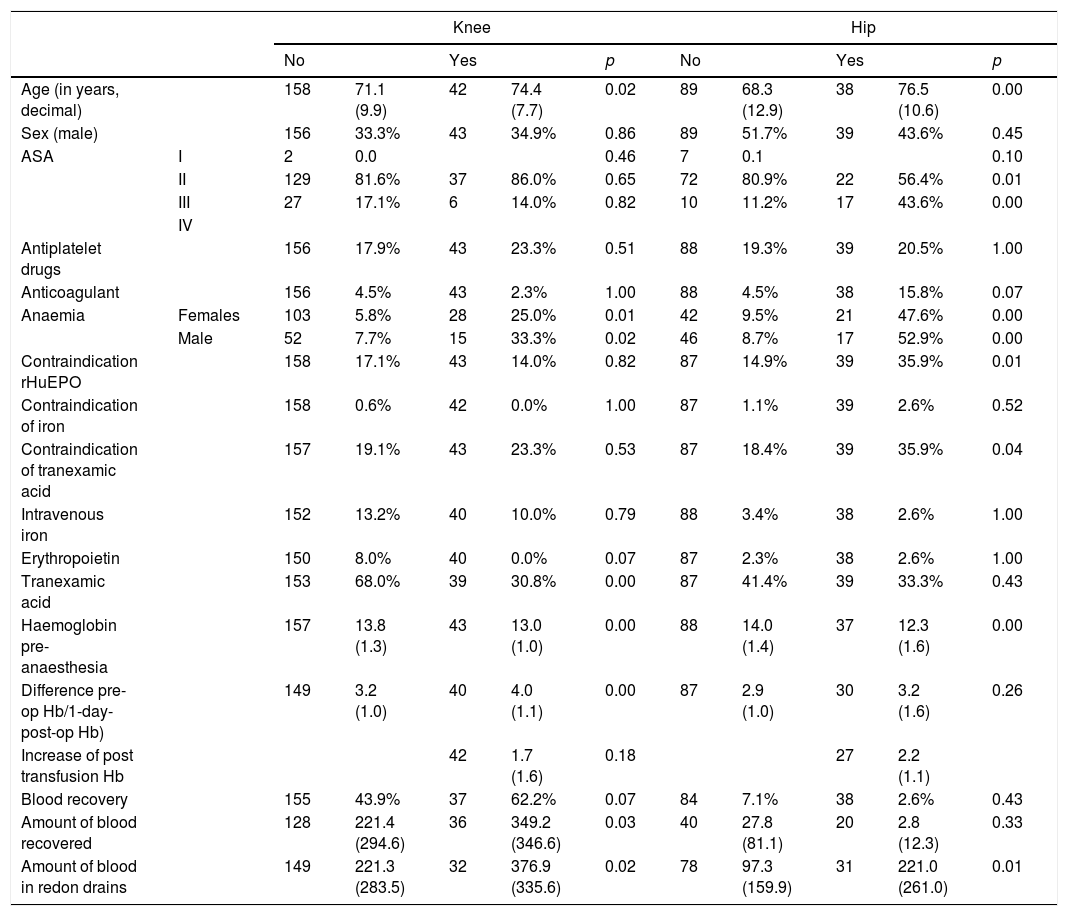Patient blood management in orthopedic surgery reduces transfusion risk. The best protocol is unknown. The effectiveness of a protocol based on the Seville Consensus on the reduction of transfusion risk is evaluated and a predictive transfusion equation is proposed in knee surgery.
Patients and methodsCohort study in patients undergoing knee and hip arthroplasty from January 2014 to December 2015 at a second level complexity hospital in Vilafranca del Penedès (Barcelona). Patients with Hb between 10 and 13g/dl were classified as anaemic with or without iron deficiency and received iron or combination of iron and erythropoietin. On the day of surgery, tranexamic acid was administered, the Hb drop was measured the next day and the requirements and the transfusion lintel were measured during the stay.
ResultsA total of 334 patients were included in the study. The implementation of the programme decreased the transfusion risk from 41.5% to 14.8% at the end of the study. In hip surgery, transfused patients were significantly older, sicker and with lower preoperative Hb. Tranexamic acid did not decrease bleeding. In knee surgery, the administration of tranexamic acid was the variable that most decreased the transfusion risk followed by a high preoperative Hb. The equation predicts transfusion risk with a sensitivity of 55% and specificity of 95.7%.
ConclusionThe implementation of the programme reduces transfusion risk. The effectiveness of tranexamic acid varies according to surgery site. The use of iron and recombinant human erythropoietin is necessary to improve Hb.
Los programas de ahorro de transfusión disminuyen el consumo de concentrados de hematíes en cirugía protésica. Se evalúa la efectividad de un protocolo basado en el Consenso de Sevilla en la disminución de la tasa transfusional y se propone una ecuación predictiva en cirugía de rodilla.
Pacientes y métodosEstudio de cohortes en pacientes sometidos a prótesis de rodilla y cadera en 2014 y 2015 en el Hospital Comarcal de l’Alt Penedès (HCAP). Pacientes con hemoglobina (Hb) entre 10 y 13g/dl se clasificaron en anemia con o sin déficit de hierro y recibieron hierro o combinación de hierro y eritropoyetina. El día de la cirugía se administró ácido tranexámico, al día siguiente se midió la caída de Hb y durante su estancia los requerimientos y el dintel transfusional.
ResultadosEl estudio incluyó 334 pacientes. El protocolo disminuyó la tasa de transfusión del 41,5 al 14,8%. En cirugía de cadera los pacientes transfundidos fueron mayores, con mayor porcentaje de comorbilidad y uso de anticoagulantes y menor Hb preoperatoria. El ácido tranexámico no se asoció a disminución del sangrado. En cirugía de rodilla, el análisis multivariante mostró que la administración de ácido tranexámico fue la variable que más disminuyó el riesgo de transfusión, seguido de valores de Hb preoperatoria más altos. La ecuación resultante predice la tasa transfusional, con una sensibilidad del 55% y una especificidad del 95,7%.
ConclusiónLa implantación del programa disminuyó la tasa transfusional. La efectividad de ácido tranexámico varía según la artroplastia. El uso conjunto de hierro y eritropoyetina recombinante humana es necesario para mejorar la Hb.
Artículo
Comprando el artículo el PDF del mismo podrá ser descargado
Precio 19,34 €
Comprar ahora










